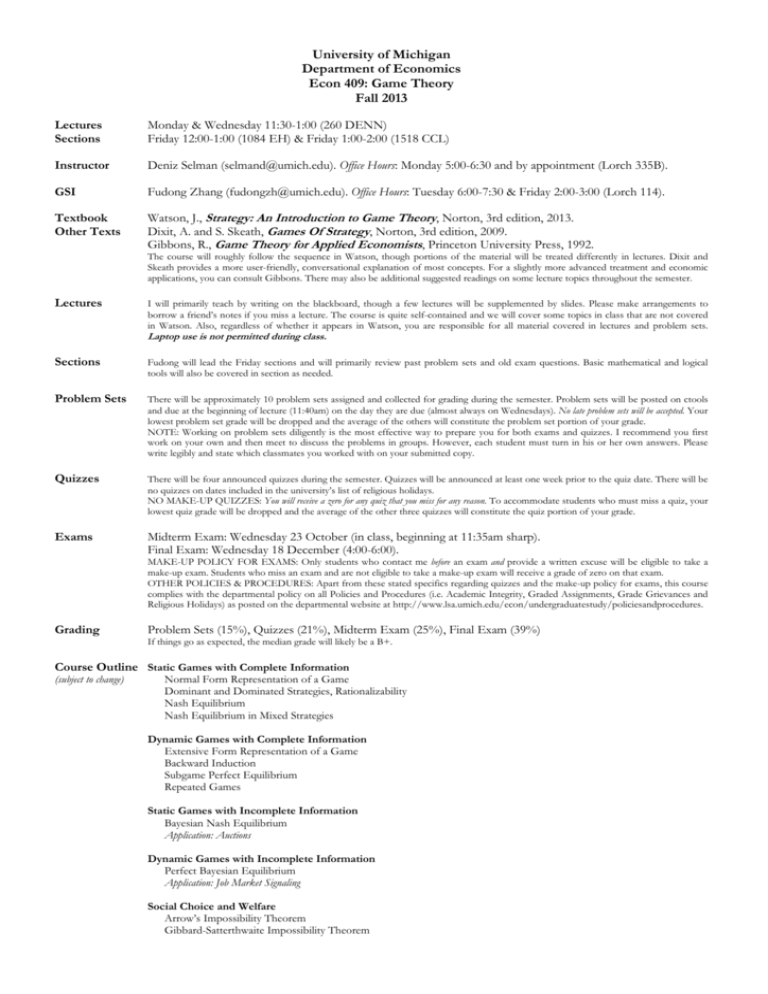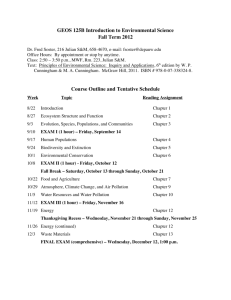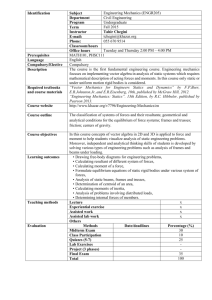Econ 409 Game Theory Syllabus - University of Michigan
advertisement

University of Michigan Department of Economics Econ 409: Game Theory Fall 2013 Lectures Sections Monday & Wednesday 11:30-1:00 (260 DENN) Friday 12:00-1:00 (1084 EH) & Friday 1:00-2:00 (1518 CCL) Instructor Deniz Selman (selmand@umich.edu). Office Hours: Monday 5:00-6:30 and by appointment (Lorch 335B). GSI Fudong Zhang (fudongzh@umich.edu). Office Hours: Tuesday 6:00-7:30 & Friday 2:00-3:00 (Lorch 114). Textbook Other Texts Watson, J., Strategy: An Introduction to Game Theory, Norton, 3rd edition, 2013. Dixit, A. and S. Skeath, Games Of Strategy, Norton, 3rd edition, 2009. Gibbons, R., Game Theory for Applied Economists, Princeton University Press, 1992. The course will roughly follow the sequence in Watson, though portions of the material will be treated differently in lectures. Dixit and Skeath provides a more user-friendly, conversational explanation of most concepts. For a slightly more advanced treatment and economic applications, you can consult Gibbons. There may also be additional suggested readings on some lecture topics throughout the semester. Lectures I will primarily teach by writing on the blackboard, though a few lectures will be supplemented by slides. Please make arrangements to borrow a friend’s notes if you miss a lecture. The course is quite self-contained and we will cover some topics in class that are not covered in Watson. Also, regardless of whether it appears in Watson, you are responsible for all material covered in lectures and problem sets. Laptop use is not permitted during class. Sections Fudong will lead the Friday sections and will primarily review past problem sets and old exam questions. Basic mathematical and logical tools will also be covered in section as needed. Problem Sets There will be approximately 10 problem sets assigned and collected for grading during the semester. Problem sets will be posted on ctools and due at the beginning of lecture (11:40am) on the day they are due (almost always on Wednesdays). No late problem sets will be accepted. Your lowest problem set grade will be dropped and the average of the others will constitute the problem set portion of your grade. NOTE: Working on problem sets diligently is the most effective way to prepare you for both exams and quizzes. I recommend you first work on your own and then meet to discuss the problems in groups. However, each student must turn in his or her own answers. Please write legibly and state which classmates you worked with on your submitted copy. Quizzes There will be four announced quizzes during the semester. Quizzes will be announced at least one week prior to the quiz date. There will be no quizzes on dates included in the university’s list of religious holidays. NO MAKE-UP QUIZZES: You will receive a zero for any quiz that you miss for any reason. To accommodate students who must miss a quiz, your lowest quiz grade will be dropped and the average of the other three quizzes will constitute the quiz portion of your grade. Exams Midterm Exam: Wednesday 23 October (in class, beginning at 11:35am sharp). Final Exam: Wednesday 18 December (4:00-6:00). MAKE-UP POLICY FOR EXAMS: Only students who contact me before an exam and provide a written excuse will be eligible to take a make-up exam. Students who miss an exam and are not eligible to take a make-up exam will receive a grade of zero on that exam. OTHER POLICIES & PROCEDURES: Apart from these stated specifics regarding quizzes and the make-up policy for exams, this course complies with the departmental policy on all Policies and Procedures (i.e. Academic Integrity, Graded Assignments, Grade Grievances and Religious Holidays) as posted on the departmental website at http://www.lsa.umich.edu/econ/undergraduatestudy/policiesandprocedures. Grading Problem Sets (15%), Quizzes (21%), Midterm Exam (25%), Final Exam (39%) If things go as expected, the median grade will likely be a B+. Course Outline Static Games with Complete Information (subject to change) Normal Form Representation of a Game Dominant and Dominated Strategies, Rationalizability Nash Equilibrium Nash Equilibrium in Mixed Strategies Dynamic Games with Complete Information Extensive Form Representation of a Game Backward Induction Subgame Perfect Equilibrium Repeated Games Static Games with Incomplete Information Bayesian Nash Equilibrium Application: Auctions Dynamic Games with Incomplete Information Perfect Bayesian Equilibrium Application: Job Market Signaling Social Choice and Welfare Arrow’s Impossibility Theorem Gibbard-Satterthwaite Impossibility Theorem







